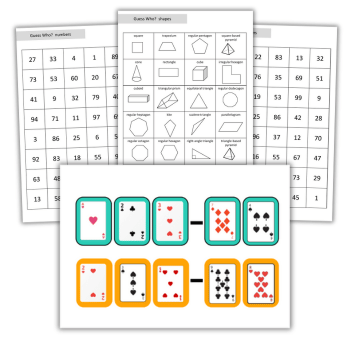We need to explicitly teach metacognition to boost maths skills

If we want children to think metacognitively, we need to explicitly teach them how and give them lots of time to practise…

- by Aidan Severs
- Education consultant, writer, speaker and former deputy head Visit website

Anyone who has ever taught primary maths will, most likely at many points, have asked themselves, ‘Why on earth did they do it like that?’.
You know, when a child completes a full written calculation just for adding 10 to another number or attempts to divide a huge number by reverting to drawing hundreds of little dots.
And it’s an absolute certainty that every primary teacher will have asked the following question, but this time with a little more frustration: ‘Why didn’t they check their answer?’.
This is especially maddening when you’re reviewing the test scripts of children who have narrowly missed out on all-important marks because of a ‘silly mistake’.
There is one answer to these two enemies of primary maths: metacognition. According to the EEF’s guidance report, metacognition is about ‘the ways learners monitor and purposefully direct their learning’.
The reason why children use inefficient methods of calculation, get a wrong answer then move on is because they’re not monitoring themselves or being purposeful enough in what they’re doing.
They’re just ‘going through the motions’, with very little concern for the outcomes. And even if they’re trying really hard and do want to do well, they’re missing important strategies that will help them to succeed.
Two problems
There are clearly two linked problems here. One is that, for some children, it would seem they don’t care enough about the work they are doing for it to matter if they are doing it efficiently or effectively.
The other is that they are not thinking enough about what they’re doing – this can be the case even for pupils who are motivated to do well.
Of course, we could teach children lots of great metacognitive techniques so that they begin to automatically, almost robotically, monitor their work to ensure they’re not choosing time-consuming ways of working and making mistakes.
But without the motivation, these techniques will go the way of the methods of calculation they’ve learnt – they’ll become the next victims of that slapdash way of working.
So motivation becomes the first thing that needs to be tackled. Along with metacognition this is a key component of self-regulated learning. But this is a thorny issue: how do we motivate children to enjoy and engage in maths?
The solutions have been many and varied: explain why this particular maths will be relevant to their lives; set it in a cross-curricular context so as to make it link to a topic; gamify the activity so it is fun; do it in an active way so that children aren’t bored; make it about the latest craze; take it outside so they’re getting fresh air at the same time.
Are these satisfactory ways of motivating children to want to do the work well?
Research shows that being motivated doesn’t necessarily lead to achievement, but that achieving something often causes children to be motivated to do more.
So our efforts might be better spent in ensuring that children experience achievement, freeing us from the pressures of trying to couch every maths concept in an all-singing, all-dancing activity.
Research also shows that interest plays a big part in motivating children – either in the task or in being able to do whatever the lesson is designed to help them do.
Because of this, we shouldn’t entirely throw away the idea of planning interesting lessons, but the more intrinsically motivating, the better; it’s preferable for children to enjoy learning because the very act of learning is enjoyable.
The other factor to bear in mind is that children can become interested in things because their teacher or peers are interested, and this too can motivate them to want to do well. Being an enthusiastic teacher of maths is a must!
Suppose, then, that you’ve motivated your pupils to want to ensure that they’re choosing sensible mathematical methods and getting correct answers, how can you help them to develop good metacognitive ways of working?
Trending
Teach multiple strategies
If children are going to choose the most efficient strategy to solve a problem, they need to know a range. They need to have these modelled and have time to practise using them.
While teaching these strategies, discuss how they might be used and what their strengths and limitations are. Suggesting a range of questions and talking about which of them would suit the particular strategy being taught will help children make the best choices.
Remember, one of the main choices children have to make is whether or not to do something mentally: when given a question on paper, children usually opt to work it out on paper too, even if this isn’t the most efficient way.
Encourage choice
Set aside whole lessons for presenting problems and giving children time to work them out their own way.
Afterwards, spend lots of time sharing methods and engaging in whole-class discussions about their efficacy. Once a child has explained their method, ask others to explain what they’ve just been shown.
Involve as many pupils as possible in this process. This will open their eyes to the number of possibilities there are when it comes to answering a question and will demonstrate that some ways are better than others, depending on the question.
Model decision making
Students who often choose inappropriate methods need to be explicitly taught to purposefully use what they have learnt. Make this a part of every lesson by modelling choice-making – thinking out loud, deliberately choosing inefficient methods, choosing two methods and comparing them, and so on.
Set activities where children have to say specifically which method they would choose, asking them to explain why.
The overarching metacognitive technique we are talking about here is planning. In essence, it’s all about slowing children down, removing that desire to rush and emphasising the process of mathematical thinking.
It’s also worth giving praise when children take this approach, rather than only celebrating correct answers. Praising effort rather than outcome is a core principle of developing a growth mindset – something that those with maths anxiety need if we are to begin to see success.
Making metacognition a habit
Metacognition can’t be reduced to a ‘metacognition maths Monday’ type of endeavour. It needs to become the way that maths lessons work every day.
If children only ever use rounding or estimating as techniques for checking the validity of their answers when they’re doing lessons on rounding or estimating, they’re not going to use them in any other scenario. Instead, they’ll see them as discrete aspects of maths that have no connection.
When children take part in mental maths lessons where all the questions are designed to be solved without using written methods, they are not being expected to make a choice.
This may lead to them not making sensible choices when they actually need to use their maths skills. When pupils need to make choices, they are forced to think mathematically.
If pupils train their thinking muscles in this way on a day-to-day basis, they’ll become much more fluent mathematicians who can manipulate the concepts that they know, adapt them and use them in a wider range of scenarios.
If we want children to think metacognitively, we need to teach them how to and give them daily opportunities to practise.
Aidan Severs is a deputy head and Y6 teacher in the north of England. Find him on his website at thatboycanteach.co.uk and follow him on Twitter at @thatboycanteach.










